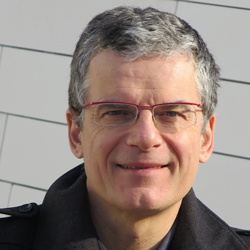Dunand Project Receives DOE Funding to Reduce Industrial Emissions
The project is receiving $500,000 from the DOE’s Advanced Manufacturing Office
A Northwestern University project including work by Professor David Dunand is one of 30 that was selected for funding by the U.S. Department of Energy (DOE) to reduce industrial emissions and manufacture clean energy technologies.

The project “Replacing Cerium with Energy-Efficient Mischmetal in Cast Aluminum Alloys for Aerospace Applications” falls under the Advanced Materials Manufacturing topic. Working with Boeing and Wisconsin-based foundry Eck Industries, the project is receiving $500,000 of the $57.9 million funded by the DOE’s Advanced Manufacturing Office.
“An attractive domestic source for lanthanum comes from the phosphor coatings of fluorescent light bulbs, which are currently landfilled: our research will enable the up-cycling of a waste product containing a rather exotic element, lanthanum,” Dunand said. “Also, these new aluminum-cerium-lanthanum alloys will replace heavier, and more expensive, titanium alloys in high-temperature aerospace parts in Boeing aircrafts, thus increasing their efficiency over tens of millions of miles of flight.”
David Weiss, vice president of research and development at Eck Industries, said the ability to use mixed rare earths in aluminum alloys offers both commercial and technical advantages.
“Separation costs for the precursors can be reduced since it is no longer necessary to separate, for example, the cerium from the lanthanum,” Weiss said. “This reduces cost and makes the alloys more commercially viable. This program will also explore the potential for technical advantages of using mixed rare earths. Traces of heavier rare earths that may be present in mischmetal may improve high temperature strength or improve the toughness of the alloys. This is barely explored territory and this program will open up new areas of application for these lightweight alloy systems.”
Dunand is a professor of materials science and engineering at the McCormick School of Engineering. His research focuses on metallic alloys, composites, foams, and scaffolds, with particular emphasis on measuring and modeling their mechanical properties in light of their microstructure. Dunand and the Structural Metallic Materials Group also investigate additive manufacturing of metals via ink extrusion plus sintering or via selective laser melting.
In 2021, the industrial sector accounted for one-third of all domestic greenhouse gas emissions — more than the annual emissions of 631 million gasoline-fueled passenger vehicles. The selected projects will help decarbonize the US industrial sector, advance clean energy manufacturing, and improve America’s economic competitiveness.
“Decarbonizing American industry while expanding our capacity to manufacture clean energy technologies is the surest way to meet the nation’s climate and economic goals,” U.S. Secretary of Energy Jennifer M. Granholm said in a news release. “The technologies funded through this investment will improve productivity, energy efficiency, and competitiveness across America's industrial sector, creating good-paying jobs for American workers.”
